- <a href="https://library.nhrc.or.th/en" aria-label="home" class="mainMenu"> <em class="fas fa-home"></em> </a>
-
About Us
ย้อนกลับ About Us<a href="https://library.nhrc.or.th/en/history" aria-label="menu" class="submenu-list" target="_self"> History </a> <a href="https://library.nhrc.or.th/en/structure" aria-label="menu" class="submenu-list" target="_self"> Organization </a> <a href="https://library.nhrc.or.th/en/vision" aria-label="menu" class="submenu-list" target="_self"> Vision/Mission </a> <a href="https://library.nhrc.or.th/en/award" aria-label="menu" class="submenu-list" target="_self"> Awards </a> <a href="https://library.nhrc.or.th/en/announce" aria-label="menu" class="submenu-list" target="_self"> Regulation/Notification </a> Organizational PolicyGallery<a href="https://library.nhrc.or.th/en/website-policy" aria-label="menu" class="submenu-list"> Website Policy </a> <a href="https://library.nhrc.or.th/en/website-security-policy" aria-label="menu" class="submenu-list"> Website Security Policy </a> <a href="https://library.nhrc.or.th/en/personal-information-protection-policy" aria-label="menu" class="submenu-list"> Personal Information Protection Policy </a> <a href="https://library.nhrc.or.th/en/privacy-policies" aria-label="menu" class="submenu-list"> Privacy Policy </a> <a href="https://library.nhrc.or.th/en/terms-of-service" aria-label="menu" class="submenu-list"> Terms of Service </a> <a href="https://library.nhrc.or.th/en/cookies-policy" aria-label="menu" class="submenu-list"> Cookies Policy </a><a href="https://library.nhrc.or.th/en/album-image" aria-label="menu" class="submenu-list"> Gallery </a> <a href="https://library.nhrc.or.th/en/gallery360" aria-label="menu" class="submenu-list"> 360° Picture </a>
-
Services
ย้อนกลับ Services<a href="https://library.nhrc.or.th/en/borrow-and-return" aria-label="menu" class="submenu-list" target="_self"> Borrowing Privileges </a> <a href="https://library.nhrc.or.th/en/service" aria-label="menu" class="submenu-list" target="_self"> Services </a> <a href="https://library.nhrc.or.th/en/flow-service" aria-label="menu" class="submenu-list" target="_self"> Workflow Services </a> <a href="https://library.nhrc.or.th/en/imfortable" aria-label="menu" class="submenu-list" target="_self"> Facilities </a> Forms<a href="https://forms.gle/syLmif2eKJ3kfA2g9" aria-label="menu" class="submenu-list" target="_blank"> Satisfaction Survey </a> <a href="https://library.nhrc.or.th/en/event" aria-label="menu" class="submenu-list" target="_self"> Activities </a> <a href="https://library.nhrc.or.th/en/plan" aria-label="menu" class="submenu-list" target="_self"> Directory </a><a href="https://library.nhrc.or.th/en/form-search" aria-label="menu" class="submenu-list"> Information Retrieval Request </a> <a href="https://library.nhrc.or.th/en/form-suggestions" aria-label="menu" class="submenu-list"> Information Resource Request </a>
-
Online Resources
ย้อนกลับ Online Resources<a href="https://library.nhrc.or.th/en/search?ctrl=kw&searchopt=&type=place&keyword=14" aria-label="menu" class="submenu-list" target="_self"> NHRC’s Collections </a> <a href="https://library.nhrc.or.th/en/search" aria-label="menu" class="submenu-list" target="_self"> Collections </a> Resources<a href="https://library.nhrc.or.th/en/network" aria-label="menu" class="submenu-list" target="_self"> Library Networks </a> <a href="https://library.nhrc.or.th/en/dictionary" aria-label="menu" class="submenu-list" target="_self"> Dictionary </a> <a href="https://library.nhrc.or.th/en/sourceresearch" aria-label="menu" class="submenu-list" target="_self"> Research/Dissertations </a> <a href="https://www.tci-thaijo.org/" aria-label="menu" class="submenu-list" target="_blank"> Thai Journals Online (ThaiJO) </a> <a href="https://ncx.dataxet.co/" aria-label="menu" class="submenu-list" target="_blank"> Online News </a> <a href="http://library.nhrc.or.th/document/Manual/APA.pdf" aria-label="menu" class="submenu-list" target="_blank"> Referencing Style Guide </a><a href="https://library.nhrc.or.th/en/law-of-human-rights" aria-label="menu" class="submenu-list"> Law of Human Rights </a> <a href="https://library.nhrc.or.th/en/international-human-rights" aria-label="menu" class="submenu-list"> International Human Rights </a> <a href="https://library.nhrc.or.th/en/international-human-rights-treaties" aria-label="menu" class="submenu-list"> International Human Rights Treaties </a> <a href="https://library.nhrc.or.th/en/national-human-rights-commissions" aria-label="menu" class="submenu-list"> Human Rights Commission </a> <a href="https://library.nhrc.or.th/en/judgment" aria-label="menu" class="submenu-list"> Judgment </a> <a href="https://library.nhrc.or.th/en/human-rights-online-resources" aria-label="menu" class="submenu-list"> Human Rights Online Resources </a> <a href="https://library.nhrc.or.th/en/un-and-affiliated-agencies" aria-label="menu" class="submenu-list"> UN and Affiliated Agencies </a>
-
Statistics
ย้อนกลับ Statistics<a href="https://library.nhrc.or.th/en/statistic/1" aria-label="menu" class="submenu-list" target="_self"> Onsite Visits </a> <a href="https://library.nhrc.or.th/en/statistic/2" aria-label="menu" class="submenu-list" target="_self"> Circulation Stat </a> <a href="https://library.nhrc.or.th/en/statistic/3" aria-label="menu" class="submenu-list" target="_self"> Reference Services </a> <a href="https://library.nhrc.or.th/en/statistic/4" aria-label="menu" class="submenu-list" target="_self"> Library Collections </a> <a href="https://library.nhrc.or.th/en/statistic/5" aria-label="menu" class="submenu-list" target="_self"> Visitors </a> <a href="https://library.nhrc.or.th/en/statistic/6" aria-label="menu" class="submenu-list" target="_self"> Website Stat </a> <a href="https://library.nhrc.or.th/en/statistic/7" aria-label="menu" class="submenu-list" target="_self"> Annual Reports </a>
-
Contacts
ย้อนกลับ Contacts<a href="https://library.nhrc.or.th/en/faq" aria-label="menu" class="submenu-list" target="_self"> FAQ </a> <a href="https://library.nhrc.or.th/en/opening-hours-close-calendar" aria-label="menu" class="submenu-list" target="_self"> Opening Hours/Close Calendar </a> <a href="https://library.nhrc.or.th/en/contacts-us" aria-label="menu" class="submenu-list" target="_self"> Contacts </a>
-
My Account
ย้อนกลับ My Account<a href="https://library.nhrc.or.th/en/membership-application" aria-label="menu" class="submenu-list" target="_self"> Membership </a> <a href="https://library.nhrc.or.th/en/member/login" aria-label="menu" class="submenu-list" target="_self"> Login </a>
NGOs and the Universal Declaration of Human Rights : a curious grapevine
| Category | Call number | Location | Status | |
|
JC571 K844 2001 |
General Books Zone | On shelf | Reserve |
| ISBN |
031223886X (pbk.)
|
| Call Number |
JC571 K844 2001
|
| Author | |
| Title |
NGOs and the Universal Declaration of Human Rights : a curious grapevine / William Korey.
|
| Imprint |
New York : Palgrave, 2001.
|
| Physical |
xi, 638 p. ; 21 cm.
|
| General Note |
Originally published: New York : St. Martin's Press, 1998.
|
| Contents Note |
Introduction
--Genesis: NGOs and the UN Charter --The 'Curious Grapevine': NGO Rights and Limitations --Silencing the NGOs at the UN --'Honored Guests': NGOs in the Struggle Against Apartheid --The NGO Prototype: The Anti-Slavery Society --An NGO Shifts Its Focus: The Pioneer International League for Human Rights --To Light a Candle: Amnesty International and the Prisoners of Conscience --A Call for US Leadership: Congress, the Struggle for Human Rights, and the NGO Factor --Overcoming 'Lingering Brickeritis': The Struggle for Genocide Treaty Ratification --Heroic Reformers: NGOs and the Helsinki Process --The Fuel and the Lubricant: NGOs and the Revolution in UN Human Rights Implementation Machinery --A Rare, Defining Moment: Vienna, 1993 --Genocide and Accountability: The Role of Human Rights Watch --Overcoming the Crisis of Growth: Human Rights Watch Spans the Globe --The 'Diplomatic' Approach vs. the 'Human Rights' Approach: The High Commissioner for Human Rights and the Blaustein Institute --Uncharted Terrain: Minority Rights, Ethnic Tension, and Conflict Prevention --The 'Unexplored Continent' of Physician Involvement in Human Rights --Mrs. Roosevelt's NGO Takes on New Dimensions: Freedom House's Changing Priorities --'Asian Values' vs. the Universal Declaration of Human Rights --Lobbying for The Rule of Law --Recapturing the Spirit of Nuremberg. |
| Summary |
When the Universal Declaration of Human Rights was adopted 50 years ago, Eleanor Roosevelt, its principal architect, predicted that a 'curious grapevine' would carry its message behind barbed wire and stone walls. This book tells the extraordinary story of how NGOs became the 'grapevine' she anticipated - sharpening our awareness about the violations of human rights, 'shaming' its most notorious abusers and creating the international mechanisms to bring about implementation of the Declaration. Korey traces how NGO's laid the groundwork for the destruction of the Soviet empire, as well as of the apartheid system in South Africa, and established the principle of accountability for crimes against humanity. The notion of human rights has progressed from being a marginal part of international relations a half century ago to stand today as a critical element in diplomatic discourse and this book shows that it is the NGOs that have placed human rights at the centre of humankind's present and future agenda.
|
| Subject Corporate Name | |
| Subject | |
| Subject | |
| Keyword | |
| Link |
| LEADER : 00000nab 2200000uu 4500 |
| 008 181108s2001||||nyu 000 0 eng d |
| 020 ^a031223886X (pbk.) |
| 050 00^aJC571^bK844 2001 |
| 100 1 ^aKorey, William,^d1922-2009 |
| 245 10^aNGOs and the Universal Declaration of Human Rights :^ba curious grapevine /^cWilliam Korey. |
| 250 ^a1st Palgrave ed. |
| 260 ^aNew York :^bPalgrave,^c2001. |
| 300 ^axi, 638 p. ;^c21 cm. |
| 500 ^aOriginally published: New York : St. Martin's Press, 1998. |
| 504 ^aIncludes bibliographical references (p. [597]-626) and index. |
| 505 0 ^aIntroduction --^tGenesis: NGOs and the UN Charter --^tThe 'Curious Grapevine': NGO Rights and Limitations --^tSilencing the NGOs at the UN --^t'Honored Guests': NGOs in the Struggle Against Apartheid --^tThe NGO Prototype: The Anti-Slavery Society --^tAn NGO Shifts Its Focus: The Pioneer International League for Human Rights --^tTo Light a Candle: Amnesty International and the Prisoners of Conscience --^tA Call for US Leadership: Congress, the Struggle for Human Rights, and the NGO Factor --^tOvercoming 'Lingering Brickeritis': The Struggle for Genocide Treaty Ratification --^tHeroic Reformers: NGOs and the Helsinki Process --^tThe Fuel and the Lubricant: NGOs and the Revolution in UN Human Rights Implementation Machinery --^tA Rare, Defining Moment: Vienna, 1993 --^tGenocide and Accountability: The Role of Human Rights Watch --^tOvercoming the Crisis of Growth: Human Rights Watch Spans the Globe --^tThe 'Diplomatic' Approach vs. the 'Human Rights' Approach: The High Commissioner for Human Rights and the Blaustein Institute --^tUncharted Terrain: Minority Rights, Ethnic Tension, and Conflict Prevention --^tThe 'Unexplored Continent' of Physician Involvement in Human Rights --^tMrs. Roosevelt's NGO Takes on New Dimensions: Freedom House's Changing Priorities --^t'Asian Values' vs. the Universal Declaration of Human Rights --^tLobbying for The Rule of Law --^tRecapturing the Spirit of Nuremberg. |
| 520 ^aWhen the Universal Declaration of Human Rights was adopted 50 years ago, Eleanor Roosevelt, its principal architect, predicted that a 'curious grapevine' would carry its message behind barbed wire and stone walls. This book tells the extraordinary story of how NGOs became the 'grapevine' she anticipated - sharpening our awareness about the violations of human rights, 'shaming' its most notorious abusers and creating the international mechanisms to bring about implementation of the Declaration. Korey traces how NGO's laid the groundwork for the destruction of the Soviet empire, as well as of the apartheid system in South Africa, and established the principle of accountability for crimes against humanity. The notion of human rights has progressed from being a marginal part of international relations a half century ago to stand today as a critical element in diplomatic discourse and this book shows that it is the NGOs that have placed human rights at the centre of humankind's present and future agenda. |
| 610 20^aUnited Nations.^bGeneral Assembly |
| 650 0^aHuman rights 0^aNon-governmental organizations |
| 653 ^aNew Arrivals 12-2018 |
| 856 40^3Content^uhttp://library.nhrc.or.th/ulib/document/Content/T10161.pdf |
| 917 ^aKN :^c3,261 |
| 955 ^a1 copy |
| 999 ^anopparat |
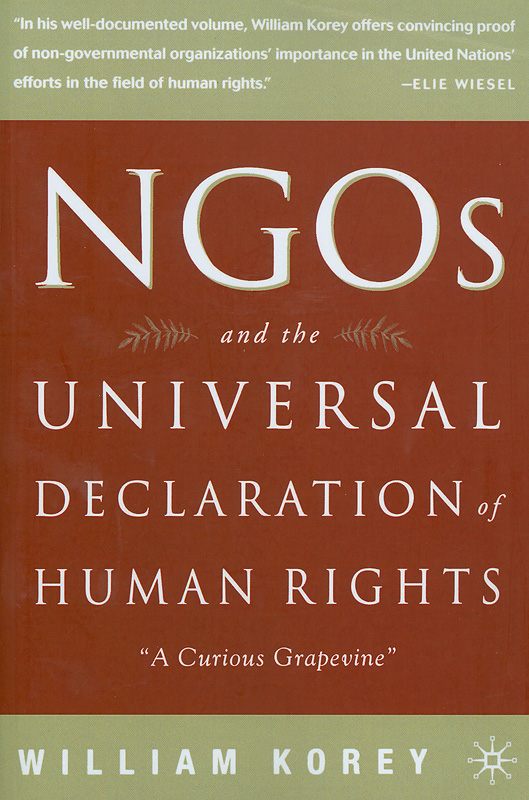
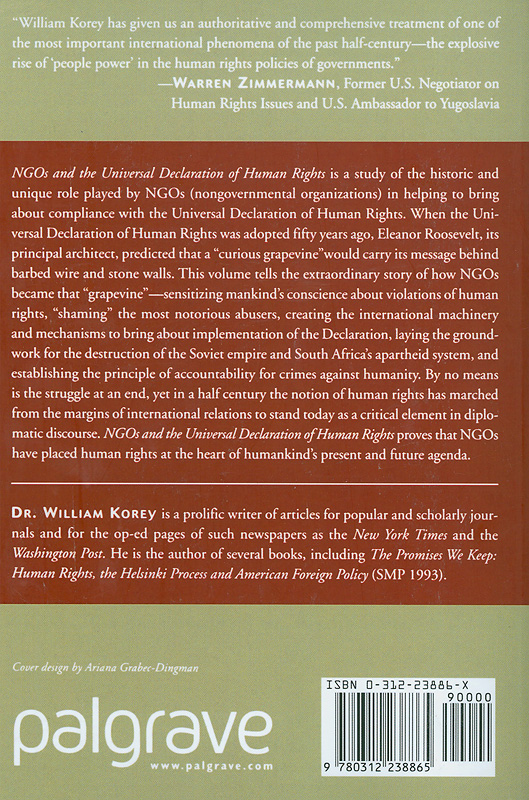
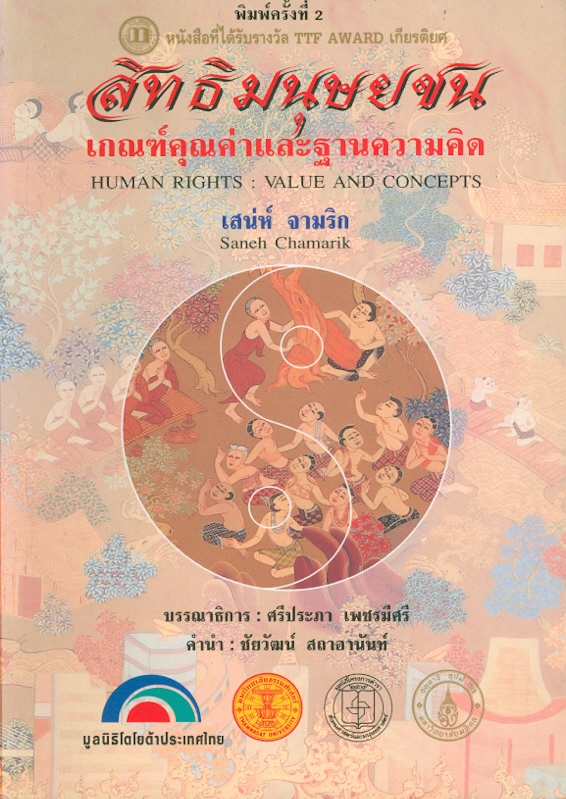
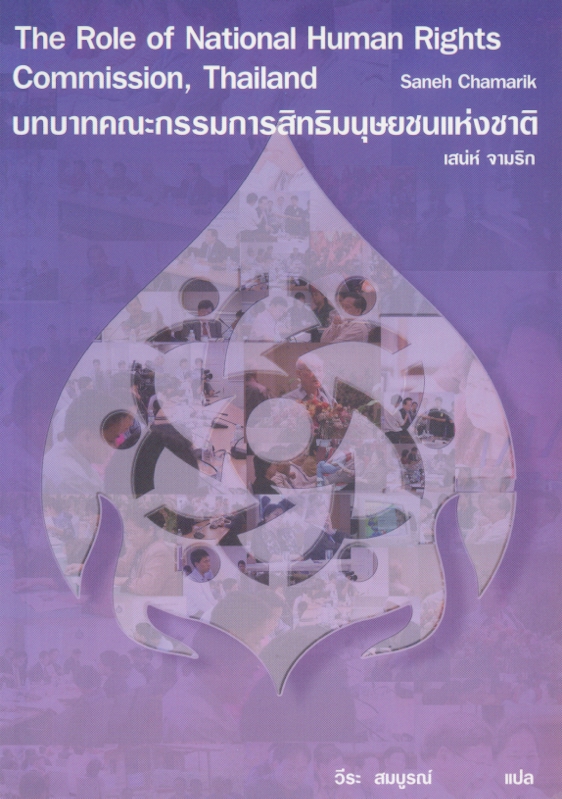
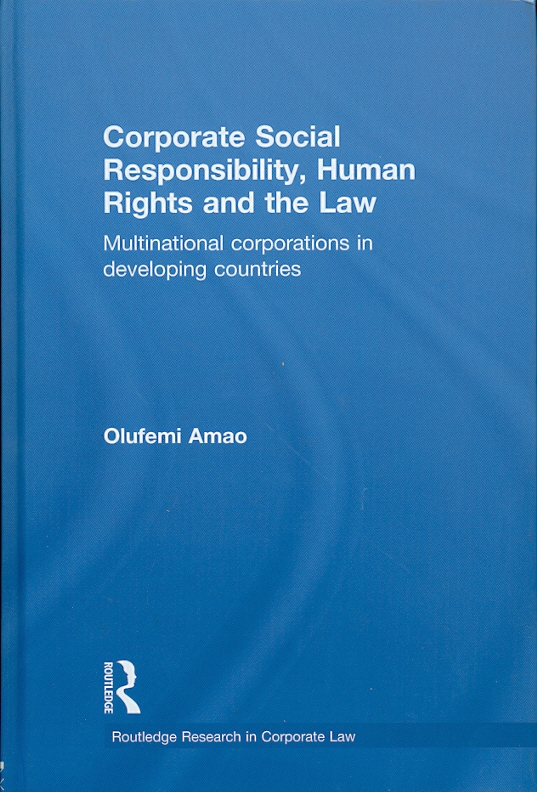

before adding tags or comments.